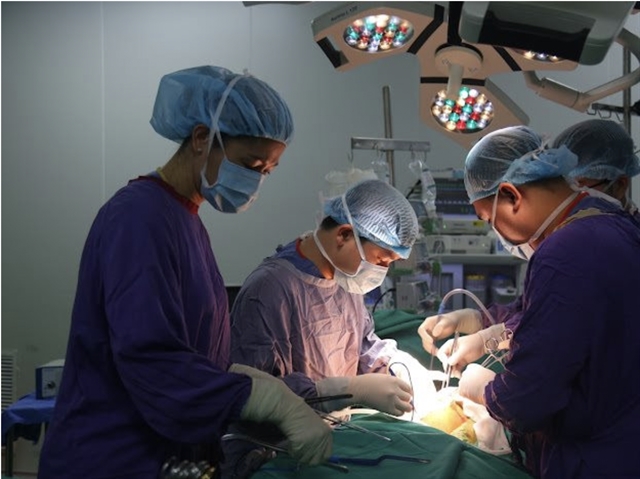 Society
Society

 |
| Doctors and medical staff at an organ retrieval surgery on April 2 at Việt Nam-Sweden Uông Bí Hospital in the north-eastern province of Quảng Ninh.—VNA/VNS Photo |
QUẢNG NINH — In the early hours of April 2, Việt Nam-Sweden Uông Bí Hospital received a patient diagnosed with brain death due to a tragic traffic accident in the north-eastern province of Quảng Ninh.
Following a conclusive diagnosis by the Brain Death Diagnosis Council, after three evaluations and with the family's consent for organ donation, the hospital swiftly devised a multi-organ retrieval plan.
The hospital collaborated closely with the National Organ Transplant Coordination Centre and other transplant centres nationwide to review and compile a list of recipients for the donated organs.
Trần Anh Cường, director of the hospital talked to the Nhân dân (The People) newspaper about the meticulous planning and preparations, including all the transportation logistics for the organs, in order for a successful overnight retrieval surgery.
The surgery, which involved 120 medical staff, including doctors, nurses and technicians, divided into multiple teams, he said.
Leading transplant centres in the country, such as 108 Military Central Hospital, Việt Nam – Germany Hospital and Huế Central Hospital, also sent doctors across to Quảng Ninh to assist.
Nguyễn Trọng Diện, director of Quảng Ninh Province's Health Department said “This is the first time organ retrieval has been performed at a provincial hospital, with the organs then sent to various transplant centres across the country, the furthest distance to Huế Central Hospital."
The organ retrieval was more successful than anticipated with support from leading Vietnamese experts, the mobilisation of local healthcare resources in the province and the dedication of the entire surgical team.
New life
Among the seven organ recipients was Nguyễn Thanh Tùng, an 11-year-old boy from Đại Yên Ward, Hạ Long City, who received a kidney.
Tùng, who was also suffering from stage-2 heart failure and faced a high risk of death, was fortunate to receive a compatible kidney for transplantation.
His mother, Phạm Thị Bích Thảo said her son was given a second chance at life thanks to the donated kidney, which had adapted well to his body. His health had improved significantly and he continued to receive regular check-ups.
“My family is very grateful to the donor,” she said.
Associate Professor Đồng Văn Hệ, director of the National Organ Transplant Coordination Centre said that the event marked a significant milestone in expanding the organ donation and transplant network at district and provincial levels.
“If the model is successful, it will increase the availability of organs, providing more opportunities to save lives,” he said.
Provincial transplant centre
Organ and tissue transplantation is the last resort for treating chronic and severe illnesses where organs are irreversibly damaged, such as chronic kidney failure, liver, heart, marrow and corneal failure.
However, the concept of organ donation remains a sensitive issue for many people, making public awareness and advocacy crucial to changing perceptions.
Since July 2023, the province's Health Department has partnered with the National Organ Transplant Coordination Centre to organise training programmes to enhance counselling and advocacy for organ donation.
Prior to this, in 2019, the department established the Organ and Tissue Donation and Transplant Advisory Team.
The department directed three major hospitals, Quảng Ninh General Hospital, Bãi Cháy Hospital and Việt Nam-Sweden Uông Bí Hospital, to develop specialised techniques for organ transplantation and establish brain death diagnosis councils.
The provincial hospitals have collaborated with the National Organ Transplant Coordination Centre to hold training sessions on "enhancing counselling and advocacy for posthumous organ donation" and to proactively mobilise transplantable organs locally.
The province's healthcare sector has formed two brain death diagnosis councils and actively trained doctors to prepare for organ transplantation.
Over 50 doctors and nurses have participated in hands-on training at central hospitals.
Cường said that the hospital was developing seven key areas of medical treatment, including organ transplantation.
The hospital had sent 40 doctors and nurses from various fields for training and technical transfer to implement organ transplantation within the province.
Recently, the Quảng Ninh Organ and Tissue Donation Advocacy Association was established, launching a campaign to register for organ and tissue donation to save lives.
The province’s healthcare sector has also conducted numerous awareness campaigns and encouraged all medical staff in the province to register as organ donors.
Bùi Mạnh Hùng, deputy director of the provincial Health Department and president of the Quảng Ninh Organ and Tissue Donation Advocacy Association said to date, all medical units in the province had joined the organ and tissue donation network and encouraged their staff to participate.
“We hope the noble act of registering as donors among medical professionals will inspire the community, raising awareness and promoting organ donation to save lives,” he said.
Quảng Ninh is the first locality with a provincial-level medical facility performing organ retrieval on-site so far.
It not only demonstrates the local health sector’s commitment to actively participating in the national organ donation and transplant network, but also showcases the capability of local medical staff to adopt and implement advanced medical techniques.— VNS

.jpg)


